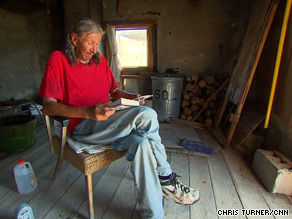There are few ethnic peoples in the world, certainly in the United States, that have suffered more or had more cause to demand justice than Native Americans. Ever since the first Europeans set foot in the New World, native peoples have been fighting a holding war, be it their lands, their customs and traditions, their religions, and even their languages. They've trusted these invaders and paid for it by the tens of thousands thanks to disease, wars, and ultimately, by the sheer numbers of these ever expanding invaders which must have seemed like endless waves drowning them little by little. Yet, with the echoes of the last of the Indian Wars having long faded away, the federal and state governments continues to wage a war of bungled good intentions and bureaucratic red tape on Native Americans when only equality is being sought.
Today, most Native Americans live on reservations; lands allotted to them by the federal government in exchange for vast and resource rich territory for the settlers is the official description given while in truth, it's more like lands that no one else wanted, and still they have little control over it or its use. Naomi Schaefer Riley just wrote an outstanding book entitled "The New Trail of Tears: How Washington Is Destroying American Indians" which delves into the plight of not just Native Americans, but offers comparisons to the First Nations of Canada. Ms. Riley expertly explains how the reservation system came about that both gives the Indians lands and at the same time, restricts or outright prohibits the buying and selling of it (75% of tribal members between the ages of 18 and 40, for instance, do not own a home), its development for commercial or residential purposes which leaves the reader with sense of the frustration the residents on these lands must feel.
Ms. Riley explores many of the reasons behind the exceptionally high unemployment rate (as high as 47% in some places) among Native Americans including a lack of adequately trained teachers, poor academic performance and the unexpected high dropout rate in tribal schools. Not surprisingly, drug abuse, crime, and alcoholism appears to be rampant across tribal lands due to the lack of jobs or businesses unable or willing to relocate their operations on tribal lands due to government and tribal red tape. Absence too are entrepreneurial opportunities for tribal members thanks to an array of restrictions; all of which has plunged Native Americans into poverty level that is two times the national average and has created an atmosphere of hopelessness and frustration.
Suicide is the leading cause of death for males between ages 10 and 14, at 57% for ages 15 to 24. Sexual abuse too has become a serious issue with 1 in 4 girls and 1 in 6 boys under the age of 18 having been molested, often by a family member. She boldly delves into the oft ignored subject of tribal politics too, including tribal nepotism, suspension of outsiders, corruption amid the federal and state bureaucratic quagmire created by such organizations as the Bureau of Indian Affairs, the tribal school boards, development boards and banks as well as the impact created by various federal legislation. Often breaking this cycle usually requires leaving the reservation behind, along with family, friends and often, their culture to seek a better life in "the white world". A bittersweet victory to be sure.
Perhaps the best part of "The New Trail of Tears" is how Ms. Riley is so able to allow the voices and emotion of those she has interviewed come through, while at the same time staying focused on the topic at hand; not the easiest thing to do when writing about social or economic justice issues. Finally, Ms Riley offers up potential solutions, if only to restart the conversation from a fresh perspective such as where education reforms have proven to be successful such as with Charter schools or ways in which funding has been attained and land ownership acquired with a minimum government intervention has accomplished, which allows for land improvements and the creation of jobs. If you have any interest in Native Americans or First Nations, history, politics, social or economic justice, then "The New Trail of Tears" by Naomi Schaefer Riley is an excellent place to start. The book is a compelling 185 pages in length.





No comments:
Post a Comment